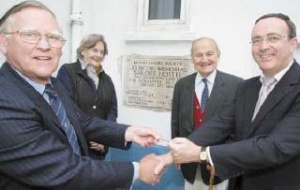George Jellicoe
George Patrick John Rushworth Jellicoe, 2nd Earl Jellicoe, KBE, DSO, MC, PC, FRS (April 4, 1918 – 22 February 2007), was the longest serving member of the House of Lords, having succeeded his father, the First World War naval commander Lord Jellicoe, in 1935 and come of age and taken his seat in 1939. Jellicoe was active in a number of policy planning groups such as the pro-NATO, European Atlantic Group, as well as being a member of the secretive dining club The Other Club.
Contents
Military career
During the Second World War he served with and then commanded the Special Boat Section and was among the first Allied soldiers to enter German-occupied Athens.
According to the blurb for a biography of Jellicoe:
- George Jellicoe has enjoyed power and privilege but never shirked his duty. His war exploits are legendary and, as a founder member of Stirling's SAS and first Commander of the Special Boat Service, he saw action a-plenty. A brigadier at 26, he liberated Athens as the Germans withdrew and saved Greece from a Communist revolution.[1]
Political career
He was Leader of the House of Lords from 1970 to 1973, when he resigned.[2]
In business
Shortly after this Jellicoe became chairman of the large sugar company Tate & Lyle. The sugar company and its directors were among the most enthusiastic backers of the Economic League all the way through its history even when it was forced to dissolve and reappear as Caprim. Jellicoe's involvement in the SAS/Special Forces and overseeing of the work of the League show the continuity of the work of organisations like Hakluyt.
Return to politics
From 1983 to 1986 he was Chairman of the British Overseas Trade Board.
Lord Jellicoe is a former chancellor of Southampton University and has been closely associated with research and higher education. He became a Fellow of the Royal Society in 1990.
When the House of Lords Act 1999 removed his right to sit in the House of Lords in right of his hereditary peerage, he was created a life peer as Baron Jellicoe of Southampton, so that he could continue to sit in the Lords.
Jellicoe has long links with the British and International Sailors' Society and oversaw the closing ceremony for the Orchard Place BISS centre in Juy 2005. The BISS reported: 'Like his father, [Jellicoe] became First Lord of the Admiralty, as well as leader of the House of Lords. He went on to head the Civil Service and more recently served as President of the Royal Geographical Society.'[3]
Affiliations
- Hakluyt (Jellicoe reportedly 'provided early encouragement' to Hakluyt)[4]
- President of the SAS Association
- European Atlantic Group former Vice President
- The Other Club, member
From House of Lords Register of Interests (2006)
- Director, UK Branch of the Winston Churchill Society (unpaid)
- Consultant of the Royal Geographical Society (unpaid)
- Former Chairman, Council of Kings College London
- Former Chancellor, Southampton University
- Former President of the Royal Geographical Society (unpaid)
- Patron, Wiltshire and Swindon Community Foundation [5]
Notes
- ↑ Blurb for A British Achilles: George, 2nd Earl Jellicoe KBE DSO MC FRS 20th Century Soldier, Politician, Statesman, by Lorna Almonds Windmill, Leo Cooper Ltd (19 Jan 2006)
- ↑ Earl Jellicoe, Minister under Heath who made a successful return to public life after his involvement in a sex scandal, The Independent, 24-February-2007, Accessed 27-December-2009
- ↑ BISS News
- ↑ Stephen Overell, Masters of the great game turn to business, Financial Times, March 22,2000.
- ↑ House of Lords Register of Interests (2006)
